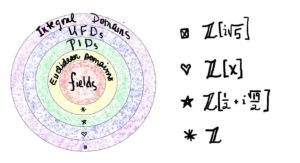In any area of math, it’s always good idea to keep a few counterexamples in your back pocket. Examples/non-examples from some of the different subsets of integral domains.

Z[i√5]Z[i5] is an integral domain which is not a UFD
That Z[i√5]Z[i5] an integral domain is easy to check (just computation).
- It’s not a UFD since we can write 6=2⋅3=(1+i√5)(1−i√5)6=2⋅3=(1+i5)(1−i5) as two distinct facorizations into irreducibles*
Z[x]Z[x] is a UFD which is not a PID
We know Z[x]Z[x] is a UFD because ZZ is a UFD (recall, a commutative ring RR is a UFD iff R[x]R[x] is a UFD).
- The ideal (2,x)={2f(x)+xg(x):f(x),g(x)∈Z[x]}(2,x)={2f(x)+xg(x):f(x),g(x)∈Z[x]} (polynomials with even constant term) is not principal**
Z[12+i√192]Z[12+i192] is a PID which is not a Euclidean domain
- This is a PID since it has a Dedekind-Hasse norm (see Dummit and Foote, 3rd ed., §8.2§8.2).
- It is not a Euclidean domain since it has no universal side divisors (ibid.).
ZZ is a Euclidean domain which is not a field
ZZ is a Euclidean domain via the absolute value norm (which gives the familiar division algorithm).
- It is not a field since the only elements which are units are 11 and −1−1.
(*) Check 2,3,1+i√52,3,1+i5, and 1−i√51−i5 are indeed irreducible in Z[i√5]Z[i5]:
Write 2=αβ2=αβ for α,β∈Z[i√5]α,β∈Z[i5]. Then α=a+ib√5α=a+ib5 and N(α)=a2+5b2N(α)=a2+5b2 for some integers a,ba,b. Since 4=N(2)=N(α)N(β)4=N(2)=N(α)N(β), we must have a2+5b2=1,2a2+5b2=1,2 or 44. Notice b=0b=0 must be true (since a2+5b2∉{1,2,4}a2+5b2∉{1,2,4} for b≥1b≥1 and for any aa). Hence either α=a=1α=a=1 or 22. If α=1α=1 then αα is a unit. If α=2α=2, then we must have β=1β=1 and so ββ is a unit.
- Showing 3 is irreducible follows a similar argument.
Write 1+i√5=αβ1+i5=αβ with α=a+ib√5α=a+ib5 so that N(α)=a2+5b2∈{1,2,3,6}N(α)=a2+5b2∈{1,2,3,6} since 6=N(α)N(β)6=N(α)N(β). Consider two cases: (case 1) If b=0b=0, then a2∈{1,2,3,6}a2∈{1,2,3,6} which is only true if a2=1a2=1 and so α=a=±1α=a=±1 is a unit. (case 2) If b>0b>0, we can only have b2=1b2=1 (since b2>1b2>1 gives a contradiction), and so a2+5∈{1,2,3,6}a2+5∈{1,2,3,6}, which implies a2=1a2=1. Hence α=±1±i√5α=±1±i5 and so N(α)=6N(α)=6. This implies N(β)=1N(β)=1 and so β=±1β=±1, which is a unit.
Showing 1−i√51−i5 is irreducible follows a similar argument.
principal in Z[x]Z[x]:
- Suppose to the contrary (2,x)=(f(x))(2,x)=(f(x)) for some polynomial f(x)∈Z[x]f(x)∈Z[x]. Since 2∈(f(x))2∈(f(x)), we must have 2=f(x)p(x)2=f(x)p(x) for some p(x)∈Z[x]p(x)∈Z[x]. Hence 0=degf(x)+degp(x)0=degf(x)+degp(x) which implies both f(x)f(x) and p(x)p(x) are constants. In particular, since 2=±1⋅±22=±1⋅±2, we need f(x),p(x)∈{±1,±2}f(x),p(x)∈{±1,±2}. If f(x)=±1f(x)=±1, then (f(x))=Z[x](f(x))=Z[x] which is a contradiction since (f(x))=(2,x)(f(x))=(2,x) mustbe a proper ideal (not every polynomial over Z[x]Z[x] has even constant term). It follows that f(x)=±2f(x)=±2. But since x∈(f(x))x∈(f(x)) as well, x=2r(x)x=2r(x) for some r(x)∈Z[x]r(x)∈Z[x]. But of course this is impossible for any polynomial with integer coefficients, r(x)r(x). Thus (2,x)(2,x) is not principal.
For more such insights, log into www.international-maths-challenge.com.
*Credit for article given to Tai-Danae Bradley*

